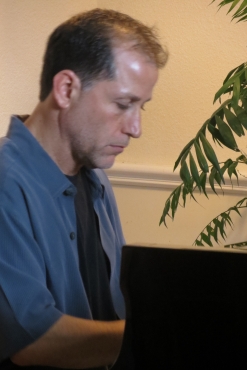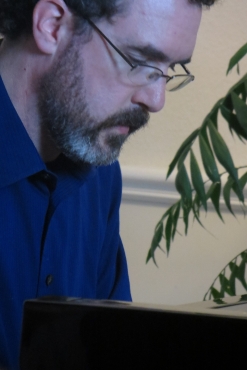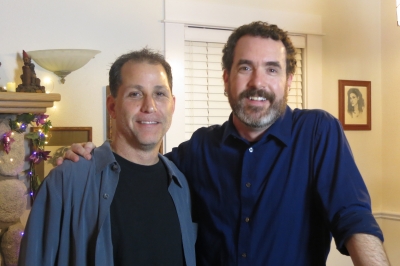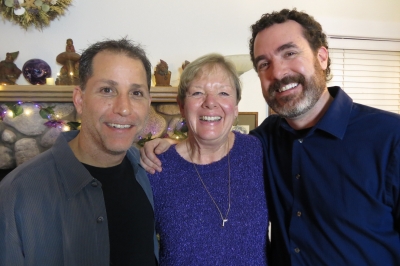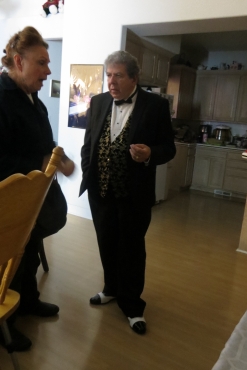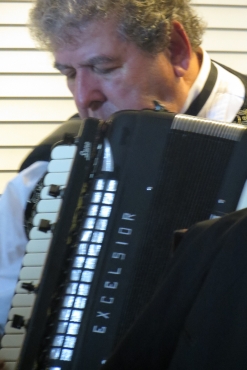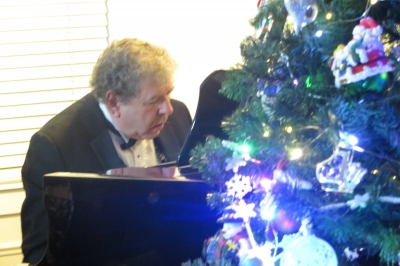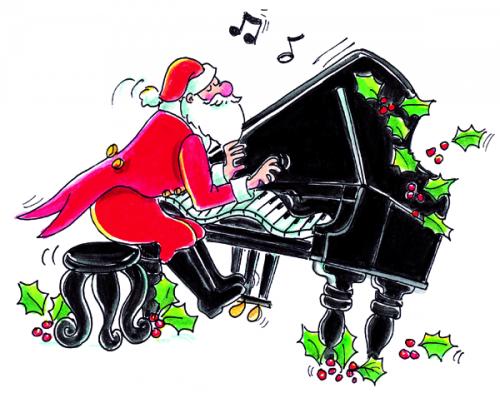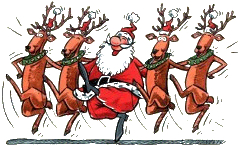Holy Spumoni! It’s time for the last issue of Pianotes for 2016! I’m not sure how that is even possible, but here we are! As usual, the December issue contains the Annual Holiday Wishes List as well as tons of holiday trivia. All of the regular articles are here, too, so enjoy!
When she died in 1980, Katherine Davis left the royalties from her compositions, including “The Little Drummer Boy,” to the music program at Wellesley’s College of Music. The royalties have financed scores of scholarships for students who would not otherwise be able to attend the private college.
Indiana and Georgia both have towns named Santa Claus.
Ernest Tubb, known as the Texas Troubadour, had the first hit version of “Blue Christmas” in 1949. It went to #1 on the country charts and became the genre’s first Christmas hit.
New Reviews: I didn’t get quite as many reviews done in November as I wanted to, but I should be able to make up for it through the end of the year. Earlier in the month, I did a tally of the number of reviews I wrote this year, and I had already broken my old record (so to speak!!!). November reviews include new albums by David Lanz, Christine Brown, Matthew Mayer and Louis Landon plus many more.
Here’s the link. I have three more Christmas CDs to review, and hope to have all three posted by this weekend.
Here's the link to that page.
I have started getting quite a few sheet music books to review, too. Philip Wesley sent me all thirteen of his songbooks to review, so if you enjoy playing his music, there will be plenty of reviews to refer to in the next few months! I also reviewed new songbooks by Kevin Kern, Louis Landon, and Shoshana Michel with many more to come!
Here's the link for that page.
Within a week of its 1952 release, the Archdiocese of Boston condemned “I Saw Mommy Kissing Santa Claus” as immoral. Other groups from both Catholic and Protestant churches followed suit. Missing the point that the man in the lyrics was actually a husband dressed up like Santa, people wrote articles and gave speeches deriding the song for casting Santa Claus as a man who fooled around. Hundreds argued that the song was sending a horrible message to America’s innocent children. The record label flew the singer, 8-year-old Jimmy Boyd, to meet with the head of the Catholic church in Boston. The boy explained the song to the church leaders, who took a second look at the song and removed its objections to it. In the process, millions of peopled tuned in to hear what all the fuss was about! The song quickly jumped to #1 on the charts and stayed there for two weeks. Three million copies were sold the first year.
Mistletoe is said to bring happiness, safety, and good fortune unless it touches the ground.
Cartoonist Thomas Nast created our image of Santa as a jolly, bearded fellow dressed in red. He also created the donkey and elephant as the political symbols for the Democratic and Republican parties.
New Interviews: There two new artist interviews this month. I interviewed Louis Colaiannia whose latest album,
Four Days in My Life, was inspired at least in part, by his visit to Florence, Oregon in June of 2015. Mike Debbage did an in-depth interview with Dave Bainbridge that’s a fascinating read. Links to both interviews are on the
interviews page.
“Silver Bells” was originally titled “Tinkle Bell” until the wife of one of the songwriters reminded them of the double-meaning of the title! She was concerned that people would think more of bathrooms than of Christmas, so they changed it to “Silver Bells.”
The first Christmas cards were produced in London in 1843. Sir Henry Cole had his friend, artist John Calcott Horsley, design the cards. One thousand were printed on cardboard and hand painted. They depicted a family toasting an absent friend with the words, “A Merry Christmas and a Happy New Year to You.” The side panels showed the poor receiving gifts.
Nat “King” Cole was chosen by the song’s composers to do the original recording of “The Christmas Song (Chestnuts Roasting By An Open Fire)” in 1946. However, the color of Cole’s skin limited the way Capitol Records could market him and the recording. Many stations, especially in the midwest and south, refused to play Cole’s music once they discovered that he was black. However, the song became a hit as thousands of white Americans purchased the record. The success of that one record opened the door for other black artists to put their own spins on holiday classics.
2017 House Concerts: I think I upset a few people when I said a couple of months ago that I wasn’t going to do as many house concerts in 2017 (we did seventeen here in 2016). I’m not planning to scale back much, but I’m not going to book seventeen again. This past year, we started concerts in early February, and then had two concerts a month most months, ending on 12/3. I’ll probably plan to host 14 or 15 concerts, so it won’t be a big change.
I’ve taken the Concerts link off the MainlyPiano homepage to make room for the Annual Wishes List link. The Concerts links and calendar will return in mid-January as I firm up dates. Some of the artists who plan to play here next year include Gary Stroutsos, David Thomas Roberts, Dan Chadburn and Tom Nichols, John Jarvie, Louis Landon, Bernward Koch, John Paris, Louis Colaiania, and several others. It should be another great year for great music on the Oregon Coast!
“Carol of the Bells” was named to honor a story that claimed that the moment Christ was born, every bell in the world chimed.
Many children look to Saint Nicholas as their patron saint. So do bankers, pawnbrokers, sailors, travelers, merchants, and thieves. Greece and Russia also adopted him as the patron saint of their countries.
Eddie Cantor made the original recording of “Santa Claus Is Coming to Town” in 1934. Within twenty-four hours of its radio debut, “Santa Claus is Coming to Town” had sold more than 30,000 records and a hundred thousand copies of the sheet music.
House Concert With Neil Patton and Steve Rivera: On November 12, we had a wonderful house concert here with pianist/composers Neil Patton and Steve Rivera. Their playing styles are quite different from each other, and both are excellent!! Neil played selections from his latest album,
Between Darkness and Light, as well as pieces from earlier recordings, and Steve played from his
Dividing the Darkness, as well as pieces from his musical and next album. I can’t wait to host them both again! Here are some photos:
In 601 AD, Pope Gregory the Great advised Christendom to take many of the pagan customs and use them to the glory of God. As a result, candles, evergreens, mistletoe, yule logs, and gift giving became part of Christmas.
The ancient Romans celebrated Saturnalia on December 25. The date marked the winter solstice and honored Saturn, the god of agriculture. The solstice marks the return of the sun to the sky and the return of the growing season. It was a time of gift-giving and great festivity. Many other pagan cultures also observed the solstice with festivities and rituals.
Saint Nicholas was the son of well-to-do Christians who lived in a province of Asia Minor in the third century and became archbishop of the seaport town of Myra. He inherited his family’s fortune and went to great pains to help people without letting them know he was the benefactor, slipping gifts into the homes of worthy people at night.
John Paris House Concert: Pianist John Paris performed his second Christmas concert (and second concert of the year here) on December 3rd. It was a CD release concert for his third Christmas album,
Christmas Past and Present, and the selections from that album were very well-received. John also played pieces from his other two Christmas albums and conducted a couple of sing-alongs. In the second half, he performed on accordion, finishing up playing his own “Black Boots Boogie” on the piano and the accordion AT THE SAME TIME! Talk about fun! Here are some photos from his concert:
Some interesting Christmas superstitions:
—It’s bad luck to let your evergreen decorations fall or to throw them away. You should burn them or feed them to your cow.
—If you eat a raw egg before anything else on Christmas morning, you will be able to carry heavy weights.
—If you refuse mincemeat pie at Christmas dinner, you will have bad luck for a year (that must be my problem! I hate the stuff!).
—Eating an apple at midnight on Christmas Eve will bring good health for a year.
—You burn your old shoes during the Christmas season in Greece to prevent misfortunes in the coming year.
"Good King Wenceslas" was a real person. He ruled over Bohemia from 928-935 AD and was loved by his subjects for his goodness and kindness.
Franklin Pierce was the first president to have a Christmas tree in the White House, in 1856.
Annual Holiday Wishes List: As I usually do, I set up an Annual Holiday Wishes List for this month’s issue of Pianotes. I’ve been compiling these lists for at least 25 years and they are always a ton of fun to do. How this works is that I ask a lot of musician and composer friends what their two biggest Holiday Wishes are. I ask for wishes because then they can be anything. I ask for two because it makes it a bit more interesting. Not surprisingly, many of the wishes this year have political undertones. As long as nobody gets nasty, I have no problem with that. The vast majority of wishes clearly indicate what a wonderful group of loving and compassionate people these artists and friends are! I will add to the list as more wishes come in, so check back from time to time and see who has been added! I’ll keep the list active until mid-January. MANY thanks to everyone who participated in this year’s list!
Here’s the link.
The first state to make Christmas an official holiday was Alabama in 1836.
On Christmas Day of 1969, the Apollo 8 astronauts read the first book of Genesis from space.
“Away In a Manger” was thought to have been written by Martin Luther, a German. During World War I, when Germany was at war with the US, many groups started to sing the words to the Scottish melody of “Flow Gently Sweet Afton” as a possible protest against all things German. History indicates that the song was probably composed by James R. Murray, an American hymn writer.
December Birthdays: Here are a few musical December birthdays:
Tom Nichols 12/2
Eric Tingstad 12/16
Gary Schmidt 12/19
Kevin Kern 12/22
Vin Downes 12/26
Happy Birthday, guys!
“O Come O Come Emmanuel” is probably the oldest of the Christmas carols still sung today. It dates back to the 9th century, and represents an ancient and important series of services celebrated by the Catholic church. The initial Latin text of the original seven verses represented the different biblical views of the Messiah. One verse per day was sung or chanted during the last seven days before Christmas. Because it brought the story of Christ to life during hundreds of years of ignorance and darkness, this ranks as one of the most important songs in the history of the Christian faith.
Some people are offended by the abbreviation of Christmas with “Xmas.” The X in Xmas is actually the Greek letter Chi and is the first letter of Christ’s name written in Greek, and has always stood in that language as a symbol for Christ without any negative connotations. The use of “Xmas” as an abbreviation for Christmas dates back to at least the 12th century and has been in continuous use ever since.
“Silent Night” was the first holiday recording to become a national hit and is the most-performed Christmas song in history. Both of the composers of the song, Joseph Mohr and Franz Gruber, died penniless, aware only that their carol was gaining popularity as part of the holiday season in Austria and Germany.
Wishing everyone a wonderful holiday season, no matter how you celebrate it. Happy Everything! And most of all, peace on earth and goodwill to all!
Kathy




